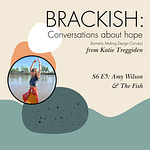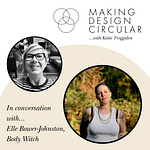In this episode of Brackish, Katie speaks with Agnes Becker, artist, science communicator, and creator of We Are Stardust, about bridging the gap between art and science, connecting with nature, and finding freedom in creative expression.
Brackish is a term used to describe water that is a mixture of saltwater and freshwater, for example, where a river meets the sea.
I first encountered it sitting in a boat in just such water and it immediately became one of my favourite words. I am fascinated by intersections, liminal and littoral spaces, overlaps and interconnections, and I want to use this space to explore all of those things – the ideas that don’t fit into neat boxes.
So, I’ll be exploring those things here – the places where craft meets nature, where the rules don’t apply and ‘shoulds’ start to fall away. From occasional ‘salty’ language to refusing to adhere to feminine standards of beauty or behaviour, I am leaning into my brackish era – and I’m doing it here with some brilliant women and non-binary folks who are doing the same.
Key Topics
Agnes shares her journey from a career in science communication to creating art that blends science and nature, emphasising the importance of awe and wonder
The evolution of Agnes’ work from precise scientific illustrations to co-creating with nature including her recent river art collection and shift toward more experimental, nature-based creative processes
They discuss their shared passion for nature and the importance of reconnecting with the natural world along with exploring the concept of "The Call of the Wild" and the benefits of nature connection, including reduced stress and increased compassion.
The value of getting to know individual species deeply (such as blackbirds and their nesting habits) and the importance of noticing subtle seasonal changes
How nature connection can help shift perspective away from human-centric thinking
Highlights
The Call of the Wild
"I distinctly remember this one meeting where we were meeting with a funder... sitting in a basement where there was no natural light at all... I had a really clear vision of being in the woods; a pine forest. I can still see it right now, and I was carrying logs. I was wearing some long linen clothes. I could almost smell the wood smoke in that moment... that was the beginning... that was this call of the wild that I talk about a lot of my work, this Call of the Wild being like, nudge, nudge nudge. This isn't quite right for you, you need to be looking elsewhere."
Nature Connection & Wonder
"Instead of just walking past by and saying, ‘yeah, there's a nice bird, singing a lovely song that's good’. Start asking; ‘I wonder where its nest is. I wonder where its mate is. I wonder if it's laid any eggs...’ suddenly the whole world opens... Curiosity opens things up, rather than closes things down."
Seasonal Awareness
"It's really helpful to mark these times so that you can root yourself into the season, not suddenly find yourself in the middle of summer and all of this time and Spring has just passed you by... we're at this time where it's still winter... but there are little stirrings of life. You've got your snowdrops coming up... the catkins are starting to drop. There's little signs of new beginnings and new life."
Connect with Agnes
Website: wearestardust.uk
Instagram: @wearestardustuk
Substack: Your Wildly Enchanted Life
Connect with Katie:
Instagram: @katietreggiden.1
Books & resources we mentioned:
If Women Rose Rooted by Sharon Blackie
Braiding Sweetgrass by Robin Wall Kimmerer
The Emerald Podcast with Joshua Schrei
Awe by Dacher Keltner The World Academy
Drawing Correspondence's Watermark course – April 2025q
Artists: Jo Lewis & Lucy Willow
The world of Stonehenge - Past exhibit at The British Museum, London
Useful Links:
Try out a nature-informed coaching tool - Find a spot in a blue (or green) space where you can spend some time without being interrupted and try out this ‘four directions meditation’ to reflect on the sustainability journey you’re on and try out a nature-informed tool at the same time.
Spread the Word:
Please share Brackish with wild abandon – and show us some love by following, subscribing or leaving a review. All that good stuff tells the ‘algorithm Gods’ to show the podcast to more people, and that can only be a good thing, right?
Dive deeper:
You can find the poem I shared on this episode along with other poems, nature-connection prompts, and short personal essays on her Substack.
About Katie Treggiden:
I’m Katie Treggiden (she/they). I am a spoken word poet, a craft, nature and sustainability writer, a certified Blue Health Coach™ and the author of Brackish here on Substack. I grew up in Cornwall and as a child, I took for granted that you could catch mackerel for the barbeque from a day boat, find grasshoppers between molehills on the lawn, and watch bats catching insects at dusk. When I returned in 2017, it was not the county I remembered. There were no longer enough mackerel for it to be worth taking a boat out fishing, and as for the grasshoppers, molehills and bats? Nowhere to be seen. In fact, the Living Planet Report published by the WWF in 2024 estimates a 73% loss in biodiversity in roughly the time I’ve been alive. That stat, and the lack of meaningful action to reverse it, breaks my heart daily.
But Baba Dioum said,
In the end, we will conserve only what we love;
we will love only what we understand.”
So I am a storyteller. If I can help people to understand and connect with nature through my poems, short stories, books and Blue Health Coaching™, perhaps we can reverse that decline.
I am also a woman in my middle years who is feeling ‘the call of the wild’ so strongly that it sometimes feels selfish to honour it. But this work is not just about the planet, because if ‘we are nature healing herself,’ we need to heal ourselves too.























Share this post